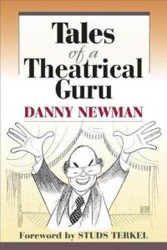Joel Grey is much more than a consummate song-and-dance man with a career spanning an astonishing eight decades: he is also the intermediate link in a Jewish-American entertainment dynasty.
His father, Mickey Katz, was the clown prince of post-war klezmer parody and “dialect comedy.” Grey’s daughter, Jennifer Grey, became a cultural icon in her own right when she portrayed Baby in the unforgettable film Dirty Dancing. Readers interested in contemporary Jewish history and the socio-economic transformations of American Jewry will find much of interest in Joel Grey’s entertaining new memoir, Master of Ceremonies—especially if they love juicy Hollywood memoirs. For those simply looking for a beautifully written moving and funny personal journey: put Master of Ceremonies on your reading list.
Readers should be warned (or tantalized) upfront that there is quite a bit of sex, and discussion of sexuality in Master of Ceremonies. What might seem distasteful for many of us today is presented with empathy and resolutely without judgment. For example, ten-year-old Joel has one of his first sexual encounters with another boy who is 16. His meetings with Jerry the elevator operator are recounted with warmth, as well as a fondness for the excitement they held for a young boy otherwise on the margins of macho American culture. Grey’s lifelong struggle to embrace his sexuality is at the emotional heart of the book. That struggle for acceptance, from himself and from his family, left me in tears, but ultimately, feeling hopeful.
The title Master of Ceremonies is a nod to the role that would define Grey’s career. He created the role in the original Broadway production of Cabaret and then went to on to re-create it for the film version a few years later, winning a Tony and an Oscar in the process. The cover of Master of Ceremonies is a striking black and white image of Grey in the MC’s ghoulishly theatrical makeup: mime white makeup, overdrawn lips, a cigar clenched in his mouth. The role of the MC wasn’t just a career-making moment; here it serves as an organizing image for Grey’s life: his desire to overcome the seedy vaudeville world represented by his father, his struggle with his sexuality, the dark side of showbiz, and the price of success.
In the early 1950s, sociologist Herbert Gans wrote of Grey’s father, Mickey Katz, that he had “moved away from his orthodox origins to assume the peculiar marginality called Yinglish.” There is something arresting about the idea of “peculiar marginality” that echoes through the work of father and son alike. If ever there were an iconic Broadway character who embodied a peculiar marginality, it was Grey’s Master of Ceremonies. Indeed, one of the highlights of the book is Grey’s recounting of how he created the character based on one of the denizens of the world of seedy nightclubs Grey so desperately tried to escape. But there’s much more to Grey than one role, and readers of Master of Ceremonies is richly rewarded by the story of his fascinating life.
Related Content:





